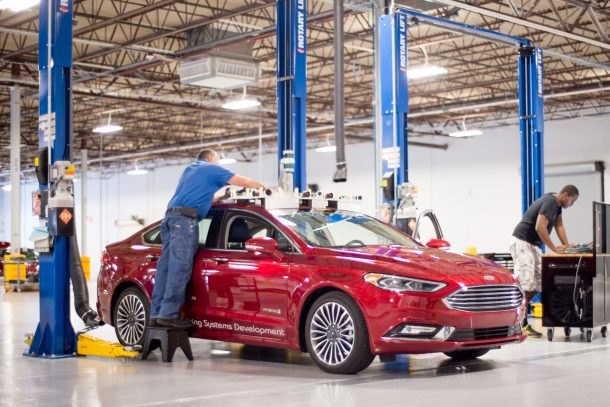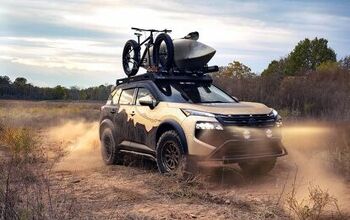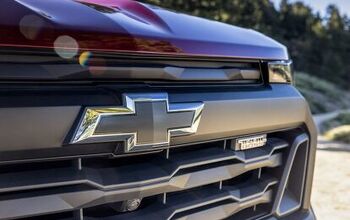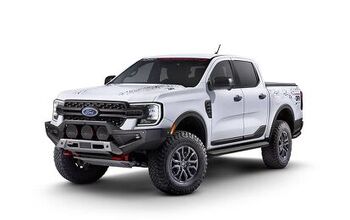Volkswagen, Ford Spar Over Alliance Investments

Hoping to minimize development costs, Volkswagen Group and Ford Motor Co. recently forged an automotive alliance. Collaborative projects officially include commercial vans and pickup trucks, though the duo are also said to be working together on electric and autonomous vehicle development. Unfortunately, trouble in pinning down the details has slightly soured the relationship.
Through the alliance, Ford could make use of VW’s MEB platform, aiding its plan to roll out a myriad of electric cars in the coming years, while Volkswagen would have access to the Blue Oval’s autonomous unit, Argo AI. But the Germans reportedly aren’t interested in paying what Ford’s asking.
According to Reuters, people familiar with the negotiations claim Ford wants VW to invest at least $500 million into its autonomous vehicle program. Considering SoftBank Group Corp and Honda jointly spent $5 billion just to have access to General Motors’ Cruise AV, the price seems reasonable. But the overriding assumption is that, despite its problems, GM’s program is further along than Ford’s.
Apparently, Volkswagen already managed to talk down the asking price at least once already. Ford reportedly sought an initial $1 billion investment, but talks dragged on for months, forcing down the fee. However, both companies maintained an optimistic face, with VW CEO Herbert Diess and Ford CEO Jim Hackett agreeing just last month that a deal would eventually be reached regarding electric and autonomous vehicles.
It’s curious why VW would be so hesitant to spend the money, especially after setting aside nearly $50 billion for the development of electric cars, autonomous driving tech, and new mobility services by 2023. Some of that cash was reportedly earmarked for its partnership with Ford.
From Reuters:
Another issue in the talks is how the companies value VW’s autonomous technology assets that will be added to the joint effort, the sources said.
Meanwhile, the companies also have been negotiating Ford’s use of VW’s MEB EV platform, including the volume involved, where VW would provide it and how much Ford would pay for its use, the sources said. However, Ford cannot use the platform until 2024 at the earliest, the people said.
Ford’s president of global markets, Jim Farley, suggested during the taping of Detroit television show “Autoline Detroit” on Monday there were challenges around the use of VW’s EV platform, saying the MEB was primarily designed for use in Europe and China, and for different consumer needs.
While some of Reuters‘ anonymous sources claim Ford will walk away from any deal it feels is unfair, most seem optimistic that a solution will be reached. Officially, neither Ford or VW had much to say on the matter beyond acknowledging that negotiations are ongoing.
[Image: Ford/Argo AI]

A staunch consumer advocate tracking industry trends and regulation. Before joining TTAC, Matt spent a decade working for marketing and research firms based in NYC. Clients included several of the world’s largest automakers, global tire brands, and aftermarket part suppliers. Dissatisfied with the corporate world and resentful of having to wear suits everyday, he pivoted to writing about cars. Since then, that man has become an ardent supporter of the right-to-repair movement, been interviewed on the auto industry by national radio broadcasts, driven more rental cars than anyone ever should, participated in amateur rallying events, and received the requisite minimum training as sanctioned by the SCCA. Handy with a wrench, Matt grew up surrounded by Detroit auto workers and managed to get a pizza delivery job before he was legally eligible. He later found himself driving box trucks through Manhattan, guaranteeing future sympathy for actual truckers. He continues to conduct research pertaining to the automotive sector as an independent contractor and has since moved back to his native Michigan, closer to where the cars are born. A contrarian, Matt claims to prefer understeer — stating that front and all-wheel drive vehicles cater best to his driving style.
More by Matt Posky
Latest Car Reviews
Read moreLatest Product Reviews
Read moreRecent Comments
- Lorenzo They won't be sold just in Beverly Hills - there's a Nieman-Marcus in nearly every big city. When they're finally junked, the transfer case will be first to be salvaged, since it'll be unused.
- Ltcmgm78 Just what we need to do: add more EVs that require a charging station! We own a Volt. We charge at home. We bought the Volt off-lease. We're retired and can do all our daily errands without burning any gasoline. For us this works, but we no longer have a work commute.
- Michael S6 Given the choice between the Hornet R/T and the Alfa, I'd pick an Uber.
- Michael S6 Nissan seems to be doing well at the low end of the market with their small cars and cuv. Competitiveness evaporates as you move up to larger size cars and suvs.
- Cprescott As long as they infest their products with CVT's, there is no reason to buy their products. Nissan's execution of CVT's is lackluster on a good day - not dependable and bad in experience of use. The brand has become like Mitsubishi - will sell to anyone with a pulse to get financed.


































Comments
Join the conversation
The real question should be why Hackett is still on charge.
Two companies in trouble coming to the realization that they don't have the answer to each other's problems. Who didn't see this coming.